Psychology for Health and Social Care: Lifespan Development Analysis
VerifiedAdded on 2022/10/11
|24
|6393
|25
Report
AI Summary
This report delves into the realm of psychology within health and social care, examining various psychological theories of lifespan development, including psychosexual, psychosocial, and cognitive theories. It explores the relationship between these theories and specific life stages, highlighting biological and social factors that influence human behavior, such as genetics, education, and social roles. The report emphasizes the importance of the health belief model (HBM) in understanding individual behavior and its application to individuals experiencing high levels of stress and behavioral disturbances. It also analyzes how psychological theories enhance the understanding of mental health disorders and relationships within health and social care settings, evaluating how these principles can affect behavior change. The report provides a comprehensive overview of the crucial underpinnings of psychological theories essential for addressing the different stages of the lifecycle, offering valuable insights for healthcare professionals.
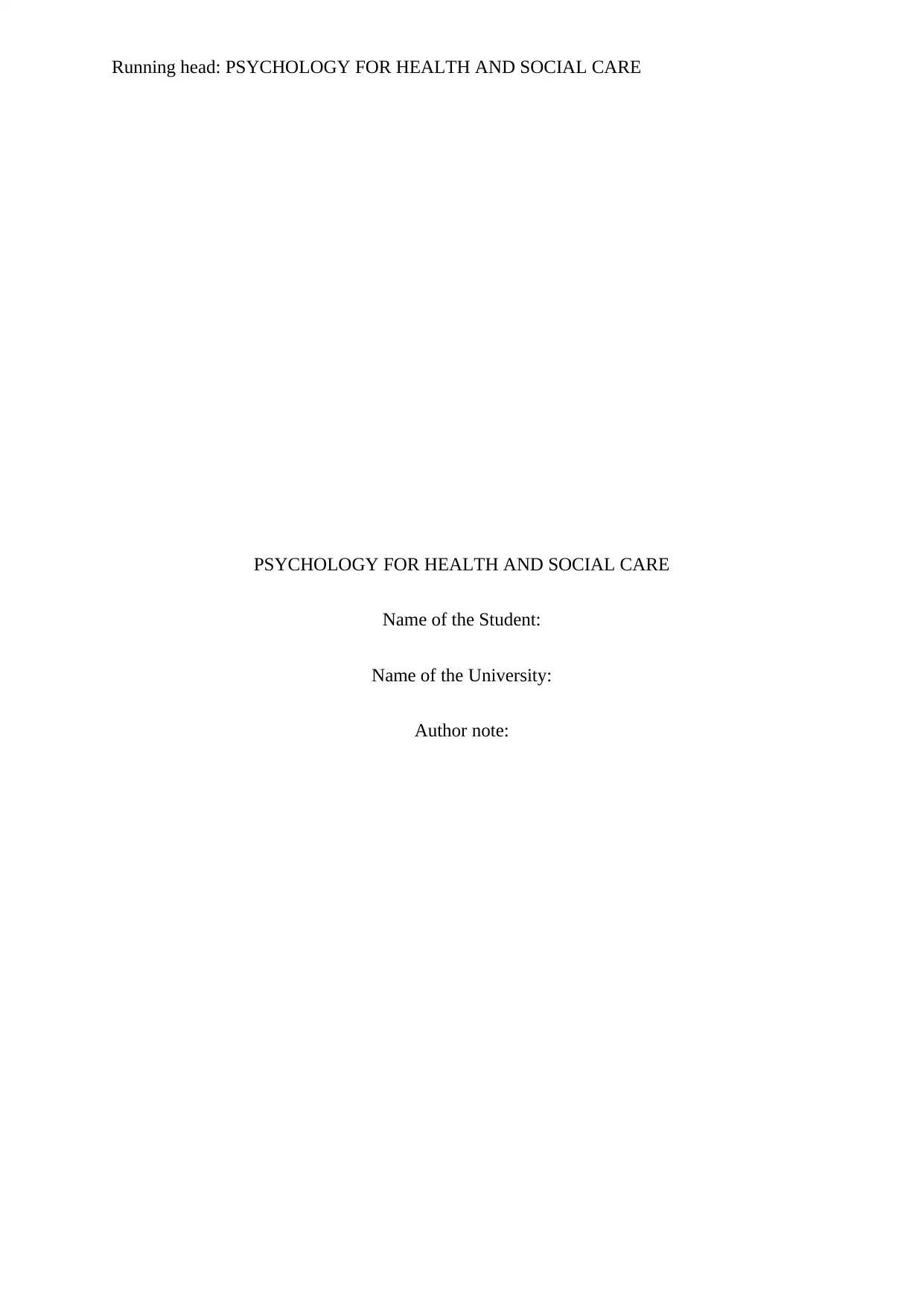
Running head: PSYCHOLOGY FOR HEALTH AND SOCIAL CARE
PSYCHOLOGY FOR HEALTH AND SOCIAL CARE
Name of the Student:
Name of the University:
Author note:
PSYCHOLOGY FOR HEALTH AND SOCIAL CARE
Name of the Student:
Name of the University:
Author note:
Paraphrase This Document
Need a fresh take? Get an instant paraphrase of this document with our AI Paraphraser
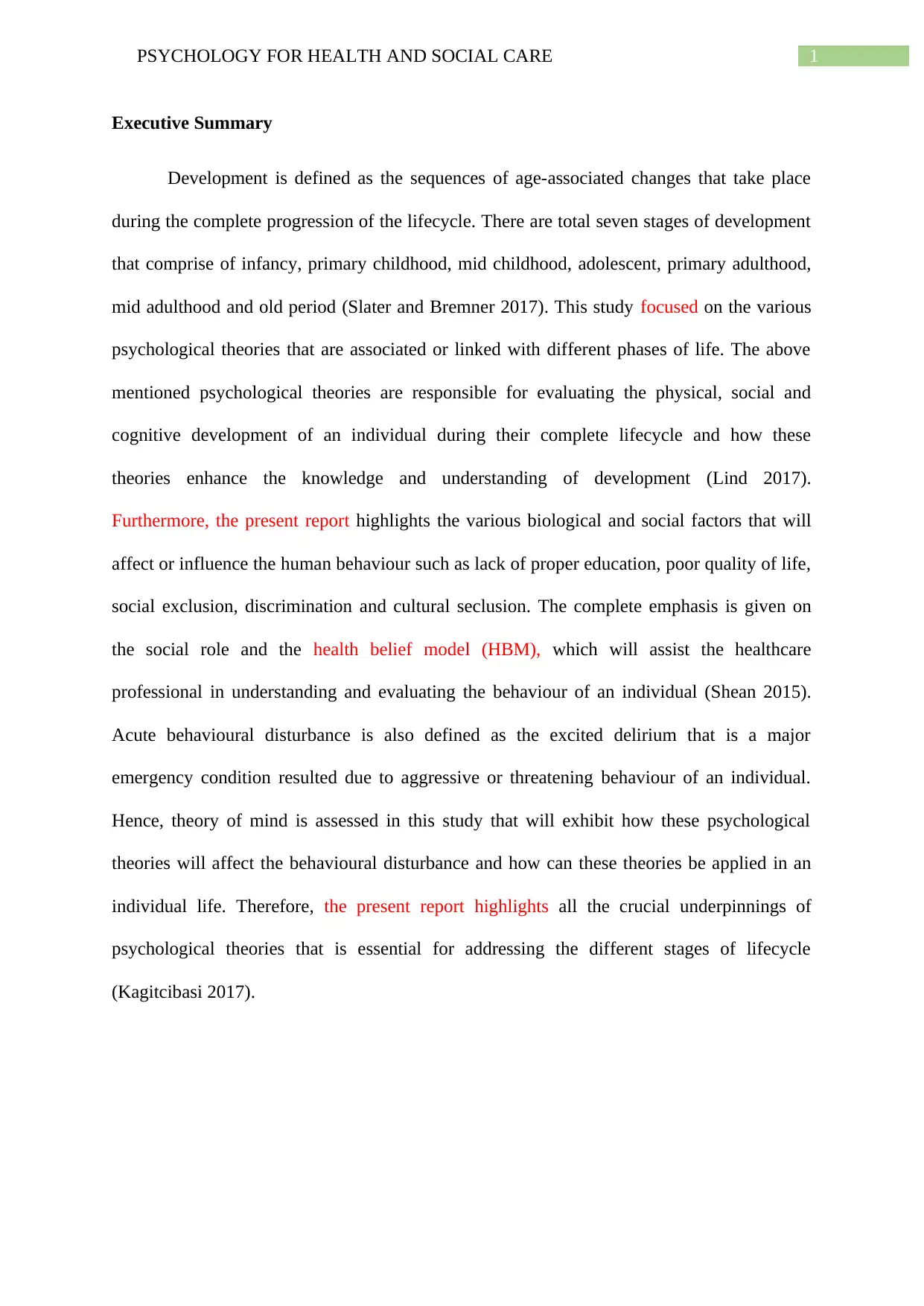
1PSYCHOLOGY FOR HEALTH AND SOCIAL CARE
Executive Summary
Development is defined as the sequences of age-associated changes that take place
during the complete progression of the lifecycle. There are total seven stages of development
that comprise of infancy, primary childhood, mid childhood, adolescent, primary adulthood,
mid adulthood and old period (Slater and Bremner 2017). This study focused on the various
psychological theories that are associated or linked with different phases of life. The above
mentioned psychological theories are responsible for evaluating the physical, social and
cognitive development of an individual during their complete lifecycle and how these
theories enhance the knowledge and understanding of development (Lind 2017).
Furthermore, the present report highlights the various biological and social factors that will
affect or influence the human behaviour such as lack of proper education, poor quality of life,
social exclusion, discrimination and cultural seclusion. The complete emphasis is given on
the social role and the health belief model (HBM), which will assist the healthcare
professional in understanding and evaluating the behaviour of an individual (Shean 2015).
Acute behavioural disturbance is also defined as the excited delirium that is a major
emergency condition resulted due to aggressive or threatening behaviour of an individual.
Hence, theory of mind is assessed in this study that will exhibit how these psychological
theories will affect the behavioural disturbance and how can these theories be applied in an
individual life. Therefore, the present report highlights all the crucial underpinnings of
psychological theories that is essential for addressing the different stages of lifecycle
(Kagitcibasi 2017).
Executive Summary
Development is defined as the sequences of age-associated changes that take place
during the complete progression of the lifecycle. There are total seven stages of development
that comprise of infancy, primary childhood, mid childhood, adolescent, primary adulthood,
mid adulthood and old period (Slater and Bremner 2017). This study focused on the various
psychological theories that are associated or linked with different phases of life. The above
mentioned psychological theories are responsible for evaluating the physical, social and
cognitive development of an individual during their complete lifecycle and how these
theories enhance the knowledge and understanding of development (Lind 2017).
Furthermore, the present report highlights the various biological and social factors that will
affect or influence the human behaviour such as lack of proper education, poor quality of life,
social exclusion, discrimination and cultural seclusion. The complete emphasis is given on
the social role and the health belief model (HBM), which will assist the healthcare
professional in understanding and evaluating the behaviour of an individual (Shean 2015).
Acute behavioural disturbance is also defined as the excited delirium that is a major
emergency condition resulted due to aggressive or threatening behaviour of an individual.
Hence, theory of mind is assessed in this study that will exhibit how these psychological
theories will affect the behavioural disturbance and how can these theories be applied in an
individual life. Therefore, the present report highlights all the crucial underpinnings of
psychological theories that is essential for addressing the different stages of lifecycle
(Kagitcibasi 2017).
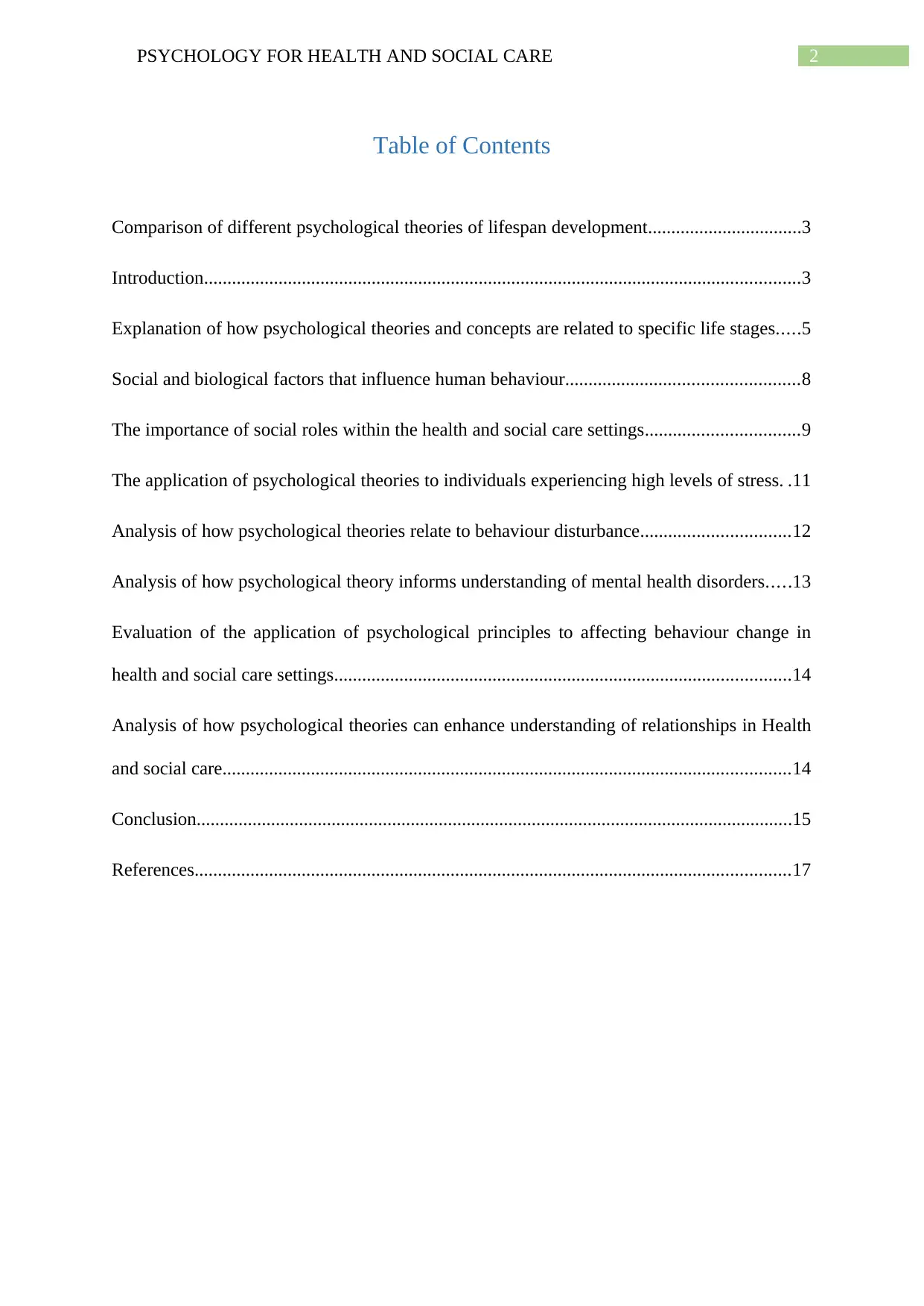
2PSYCHOLOGY FOR HEALTH AND SOCIAL CARE
Table of Contents
Comparison of different psychological theories of lifespan development.................................3
Introduction................................................................................................................................3
Explanation of how psychological theories and concepts are related to specific life stages.....5
Social and biological factors that influence human behaviour..................................................8
The importance of social roles within the health and social care settings.................................9
The application of psychological theories to individuals experiencing high levels of stress. .11
Analysis of how psychological theories relate to behaviour disturbance................................12
Analysis of how psychological theory informs understanding of mental health disorders.....13
Evaluation of the application of psychological principles to affecting behaviour change in
health and social care settings..................................................................................................14
Analysis of how psychological theories can enhance understanding of relationships in Health
and social care..........................................................................................................................14
Conclusion................................................................................................................................15
References................................................................................................................................17
Table of Contents
Comparison of different psychological theories of lifespan development.................................3
Introduction................................................................................................................................3
Explanation of how psychological theories and concepts are related to specific life stages.....5
Social and biological factors that influence human behaviour..................................................8
The importance of social roles within the health and social care settings.................................9
The application of psychological theories to individuals experiencing high levels of stress. .11
Analysis of how psychological theories relate to behaviour disturbance................................12
Analysis of how psychological theory informs understanding of mental health disorders.....13
Evaluation of the application of psychological principles to affecting behaviour change in
health and social care settings..................................................................................................14
Analysis of how psychological theories can enhance understanding of relationships in Health
and social care..........................................................................................................................14
Conclusion................................................................................................................................15
References................................................................................................................................17
⊘ This is a preview!⊘
Do you want full access?
Subscribe today to unlock all pages.

Trusted by 1+ million students worldwide
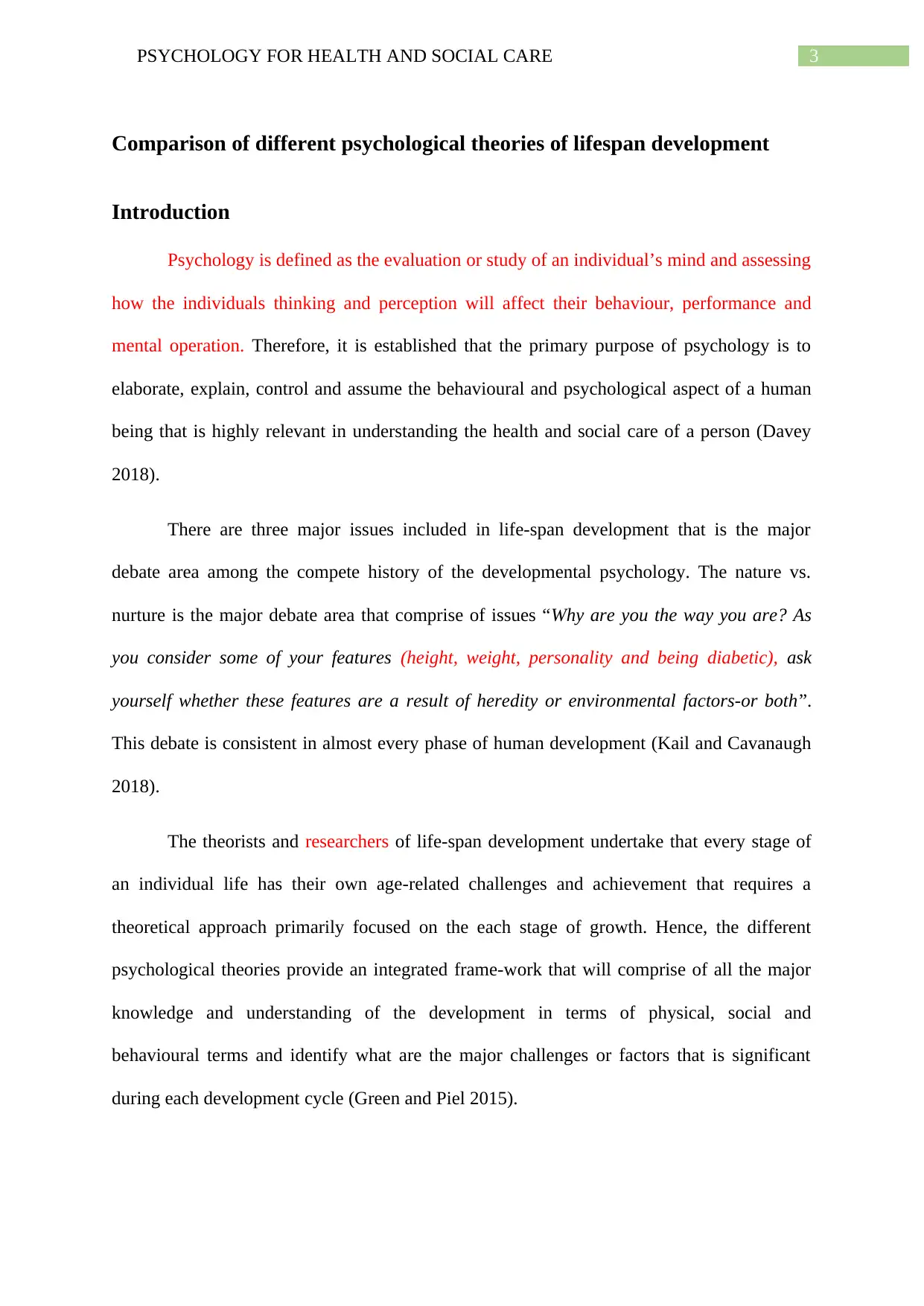
3PSYCHOLOGY FOR HEALTH AND SOCIAL CARE
Comparison of different psychological theories of lifespan development
Introduction
Psychology is defined as the evaluation or study of an individual’s mind and assessing
how the individuals thinking and perception will affect their behaviour, performance and
mental operation. Therefore, it is established that the primary purpose of psychology is to
elaborate, explain, control and assume the behavioural and psychological aspect of a human
being that is highly relevant in understanding the health and social care of a person (Davey
2018).
There are three major issues included in life-span development that is the major
debate area among the compete history of the developmental psychology. The nature vs.
nurture is the major debate area that comprise of issues “Why are you the way you are? As
you consider some of your features (height, weight, personality and being diabetic), ask
yourself whether these features are a result of heredity or environmental factors-or both”.
This debate is consistent in almost every phase of human development (Kail and Cavanaugh
2018).
The theorists and researchers of life-span development undertake that every stage of
an individual life has their own age-related challenges and achievement that requires a
theoretical approach primarily focused on the each stage of growth. Hence, the different
psychological theories provide an integrated frame-work that will comprise of all the major
knowledge and understanding of the development in terms of physical, social and
behavioural terms and identify what are the major challenges or factors that is significant
during each development cycle (Green and Piel 2015).
Comparison of different psychological theories of lifespan development
Introduction
Psychology is defined as the evaluation or study of an individual’s mind and assessing
how the individuals thinking and perception will affect their behaviour, performance and
mental operation. Therefore, it is established that the primary purpose of psychology is to
elaborate, explain, control and assume the behavioural and psychological aspect of a human
being that is highly relevant in understanding the health and social care of a person (Davey
2018).
There are three major issues included in life-span development that is the major
debate area among the compete history of the developmental psychology. The nature vs.
nurture is the major debate area that comprise of issues “Why are you the way you are? As
you consider some of your features (height, weight, personality and being diabetic), ask
yourself whether these features are a result of heredity or environmental factors-or both”.
This debate is consistent in almost every phase of human development (Kail and Cavanaugh
2018).
The theorists and researchers of life-span development undertake that every stage of
an individual life has their own age-related challenges and achievement that requires a
theoretical approach primarily focused on the each stage of growth. Hence, the different
psychological theories provide an integrated frame-work that will comprise of all the major
knowledge and understanding of the development in terms of physical, social and
behavioural terms and identify what are the major challenges or factors that is significant
during each development cycle (Green and Piel 2015).
Paraphrase This Document
Need a fresh take? Get an instant paraphrase of this document with our AI Paraphraser
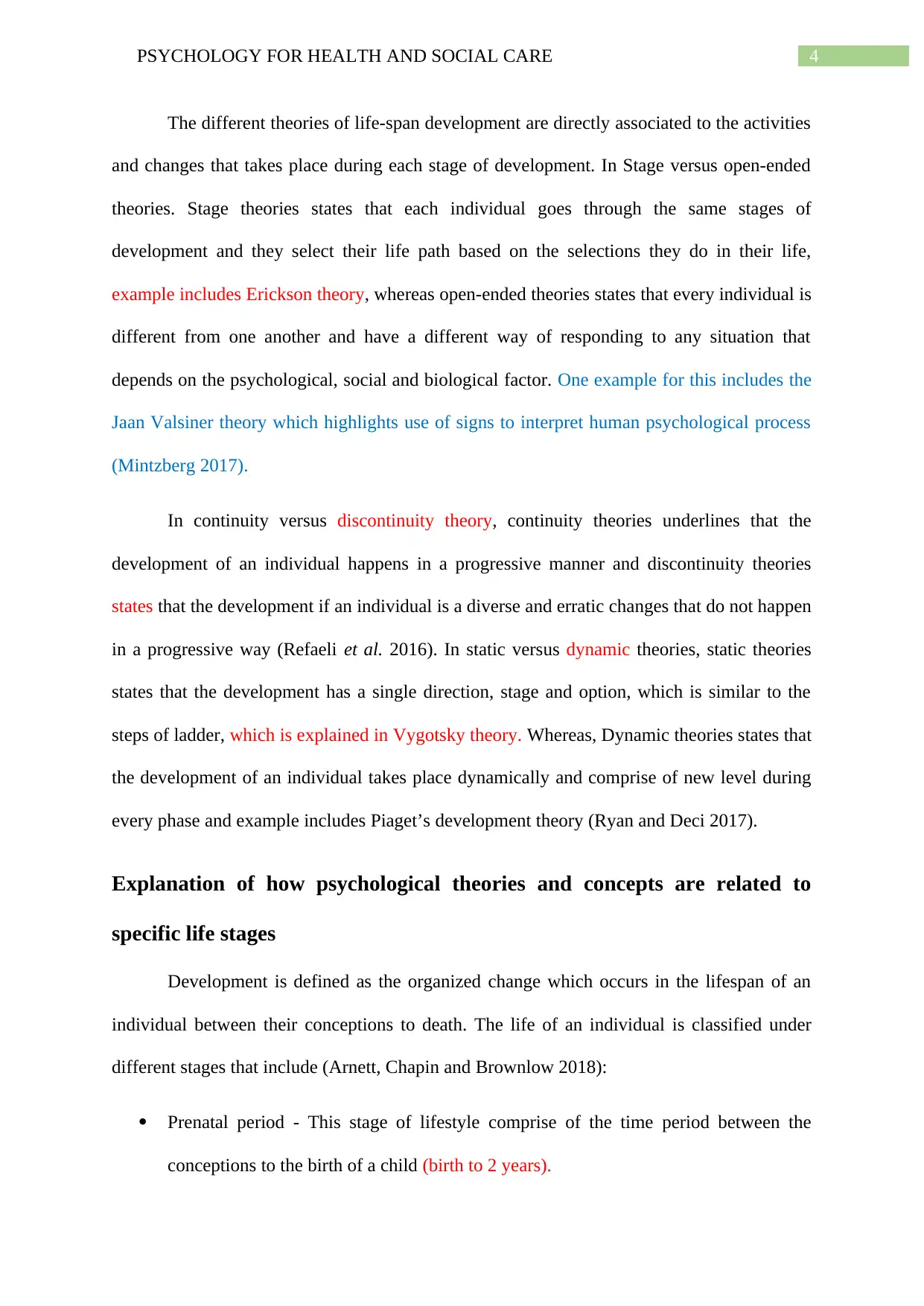
4PSYCHOLOGY FOR HEALTH AND SOCIAL CARE
The different theories of life-span development are directly associated to the activities
and changes that takes place during each stage of development. In Stage versus open-ended
theories. Stage theories states that each individual goes through the same stages of
development and they select their life path based on the selections they do in their life,
example includes Erickson theory, whereas open-ended theories states that every individual is
different from one another and have a different way of responding to any situation that
depends on the psychological, social and biological factor. One example for this includes the
Jaan Valsiner theory which highlights use of signs to interpret human psychological process
(Mintzberg 2017).
In continuity versus discontinuity theory, continuity theories underlines that the
development of an individual happens in a progressive manner and discontinuity theories
states that the development if an individual is a diverse and erratic changes that do not happen
in a progressive way (Refaeli et al. 2016). In static versus dynamic theories, static theories
states that the development has a single direction, stage and option, which is similar to the
steps of ladder, which is explained in Vygotsky theory. Whereas, Dynamic theories states that
the development of an individual takes place dynamically and comprise of new level during
every phase and example includes Piaget’s development theory (Ryan and Deci 2017).
Explanation of how psychological theories and concepts are related to
specific life stages
Development is defined as the organized change which occurs in the lifespan of an
individual between their conceptions to death. The life of an individual is classified under
different stages that include (Arnett, Chapin and Brownlow 2018):
Prenatal period - This stage of lifestyle comprise of the time period between the
conceptions to the birth of a child (birth to 2 years).
The different theories of life-span development are directly associated to the activities
and changes that takes place during each stage of development. In Stage versus open-ended
theories. Stage theories states that each individual goes through the same stages of
development and they select their life path based on the selections they do in their life,
example includes Erickson theory, whereas open-ended theories states that every individual is
different from one another and have a different way of responding to any situation that
depends on the psychological, social and biological factor. One example for this includes the
Jaan Valsiner theory which highlights use of signs to interpret human psychological process
(Mintzberg 2017).
In continuity versus discontinuity theory, continuity theories underlines that the
development of an individual happens in a progressive manner and discontinuity theories
states that the development if an individual is a diverse and erratic changes that do not happen
in a progressive way (Refaeli et al. 2016). In static versus dynamic theories, static theories
states that the development has a single direction, stage and option, which is similar to the
steps of ladder, which is explained in Vygotsky theory. Whereas, Dynamic theories states that
the development of an individual takes place dynamically and comprise of new level during
every phase and example includes Piaget’s development theory (Ryan and Deci 2017).
Explanation of how psychological theories and concepts are related to
specific life stages
Development is defined as the organized change which occurs in the lifespan of an
individual between their conceptions to death. The life of an individual is classified under
different stages that include (Arnett, Chapin and Brownlow 2018):
Prenatal period - This stage of lifestyle comprise of the time period between the
conceptions to the birth of a child (birth to 2 years).
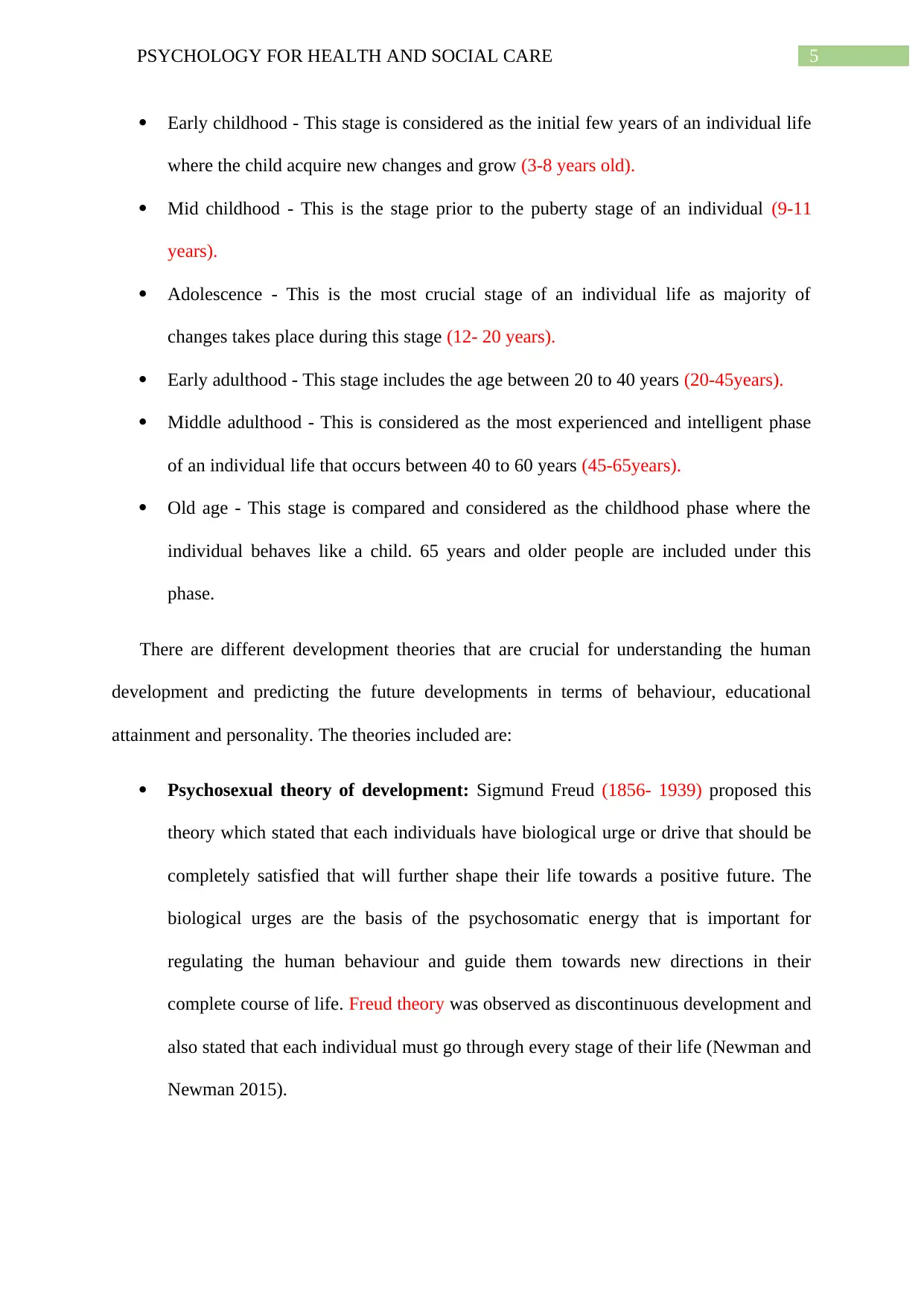
5PSYCHOLOGY FOR HEALTH AND SOCIAL CARE
Early childhood - This stage is considered as the initial few years of an individual life
where the child acquire new changes and grow (3-8 years old).
Mid childhood - This is the stage prior to the puberty stage of an individual (9-11
years).
Adolescence - This is the most crucial stage of an individual life as majority of
changes takes place during this stage (12- 20 years).
Early adulthood - This stage includes the age between 20 to 40 years (20-45years).
Middle adulthood - This is considered as the most experienced and intelligent phase
of an individual life that occurs between 40 to 60 years (45-65years).
Old age - This stage is compared and considered as the childhood phase where the
individual behaves like a child. 65 years and older people are included under this
phase.
There are different development theories that are crucial for understanding the human
development and predicting the future developments in terms of behaviour, educational
attainment and personality. The theories included are:
Psychosexual theory of development: Sigmund Freud (1856- 1939) proposed this
theory which stated that each individuals have biological urge or drive that should be
completely satisfied that will further shape their life towards a positive future. The
biological urges are the basis of the psychosomatic energy that is important for
regulating the human behaviour and guide them towards new directions in their
complete course of life. Freud theory was observed as discontinuous development and
also stated that each individual must go through every stage of their life (Newman and
Newman 2015).
Early childhood - This stage is considered as the initial few years of an individual life
where the child acquire new changes and grow (3-8 years old).
Mid childhood - This is the stage prior to the puberty stage of an individual (9-11
years).
Adolescence - This is the most crucial stage of an individual life as majority of
changes takes place during this stage (12- 20 years).
Early adulthood - This stage includes the age between 20 to 40 years (20-45years).
Middle adulthood - This is considered as the most experienced and intelligent phase
of an individual life that occurs between 40 to 60 years (45-65years).
Old age - This stage is compared and considered as the childhood phase where the
individual behaves like a child. 65 years and older people are included under this
phase.
There are different development theories that are crucial for understanding the human
development and predicting the future developments in terms of behaviour, educational
attainment and personality. The theories included are:
Psychosexual theory of development: Sigmund Freud (1856- 1939) proposed this
theory which stated that each individuals have biological urge or drive that should be
completely satisfied that will further shape their life towards a positive future. The
biological urges are the basis of the psychosomatic energy that is important for
regulating the human behaviour and guide them towards new directions in their
complete course of life. Freud theory was observed as discontinuous development and
also stated that each individual must go through every stage of their life (Newman and
Newman 2015).
⊘ This is a preview!⊘
Do you want full access?
Subscribe today to unlock all pages.

Trusted by 1+ million students worldwide
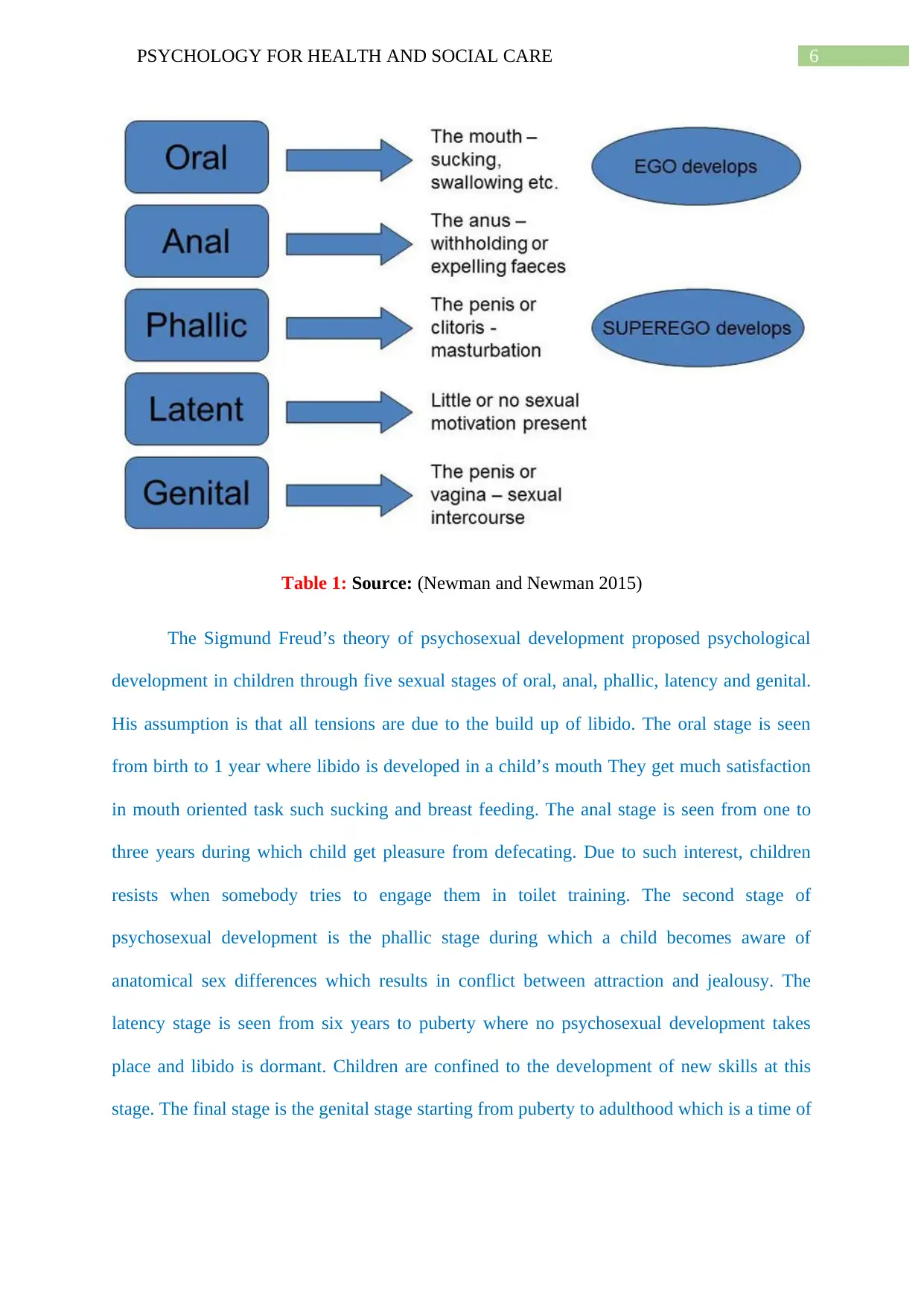
6PSYCHOLOGY FOR HEALTH AND SOCIAL CARE
Table 1: Source: (Newman and Newman 2015)
The Sigmund Freud’s theory of psychosexual development proposed psychological
development in children through five sexual stages of oral, anal, phallic, latency and genital.
His assumption is that all tensions are due to the build up of libido. The oral stage is seen
from birth to 1 year where libido is developed in a child’s mouth They get much satisfaction
in mouth oriented task such sucking and breast feeding. The anal stage is seen from one to
three years during which child get pleasure from defecating. Due to such interest, children
resists when somebody tries to engage them in toilet training. The second stage of
psychosexual development is the phallic stage during which a child becomes aware of
anatomical sex differences which results in conflict between attraction and jealousy. The
latency stage is seen from six years to puberty where no psychosexual development takes
place and libido is dormant. Children are confined to the development of new skills at this
stage. The final stage is the genital stage starting from puberty to adulthood which is a time of
Table 1: Source: (Newman and Newman 2015)
The Sigmund Freud’s theory of psychosexual development proposed psychological
development in children through five sexual stages of oral, anal, phallic, latency and genital.
His assumption is that all tensions are due to the build up of libido. The oral stage is seen
from birth to 1 year where libido is developed in a child’s mouth They get much satisfaction
in mouth oriented task such sucking and breast feeding. The anal stage is seen from one to
three years during which child get pleasure from defecating. Due to such interest, children
resists when somebody tries to engage them in toilet training. The second stage of
psychosexual development is the phallic stage during which a child becomes aware of
anatomical sex differences which results in conflict between attraction and jealousy. The
latency stage is seen from six years to puberty where no psychosexual development takes
place and libido is dormant. Children are confined to the development of new skills at this
stage. The final stage is the genital stage starting from puberty to adulthood which is a time of
Paraphrase This Document
Need a fresh take? Get an instant paraphrase of this document with our AI Paraphraser
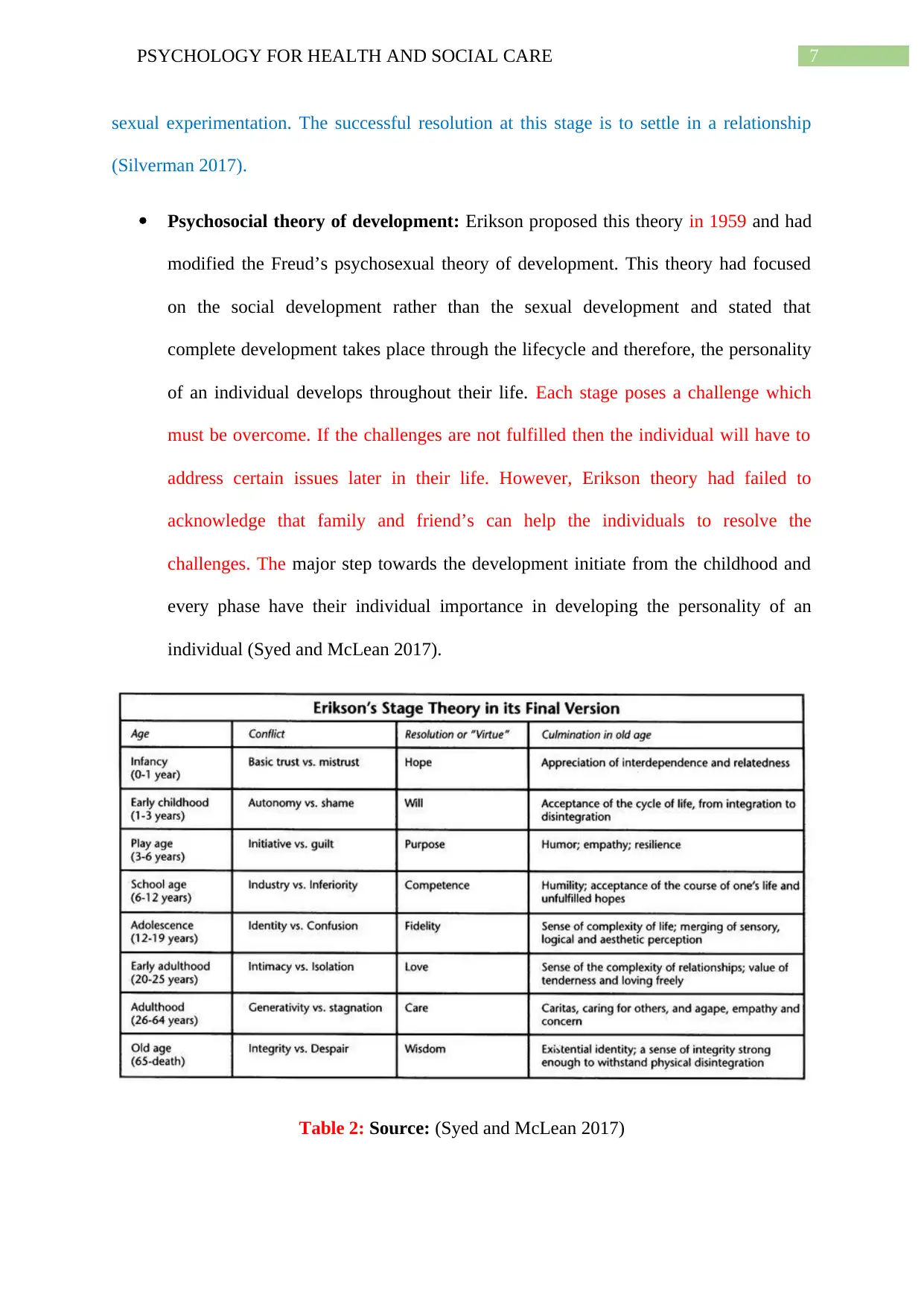
7PSYCHOLOGY FOR HEALTH AND SOCIAL CARE
sexual experimentation. The successful resolution at this stage is to settle in a relationship
(Silverman 2017).
Psychosocial theory of development: Erikson proposed this theory in 1959 and had
modified the Freud’s psychosexual theory of development. This theory had focused
on the social development rather than the sexual development and stated that
complete development takes place through the lifecycle and therefore, the personality
of an individual develops throughout their life. Each stage poses a challenge which
must be overcome. If the challenges are not fulfilled then the individual will have to
address certain issues later in their life. However, Erikson theory had failed to
acknowledge that family and friend’s can help the individuals to resolve the
challenges. The major step towards the development initiate from the childhood and
every phase have their individual importance in developing the personality of an
individual (Syed and McLean 2017).
Table 2: Source: (Syed and McLean 2017)
sexual experimentation. The successful resolution at this stage is to settle in a relationship
(Silverman 2017).
Psychosocial theory of development: Erikson proposed this theory in 1959 and had
modified the Freud’s psychosexual theory of development. This theory had focused
on the social development rather than the sexual development and stated that
complete development takes place through the lifecycle and therefore, the personality
of an individual develops throughout their life. Each stage poses a challenge which
must be overcome. If the challenges are not fulfilled then the individual will have to
address certain issues later in their life. However, Erikson theory had failed to
acknowledge that family and friend’s can help the individuals to resolve the
challenges. The major step towards the development initiate from the childhood and
every phase have their individual importance in developing the personality of an
individual (Syed and McLean 2017).
Table 2: Source: (Syed and McLean 2017)
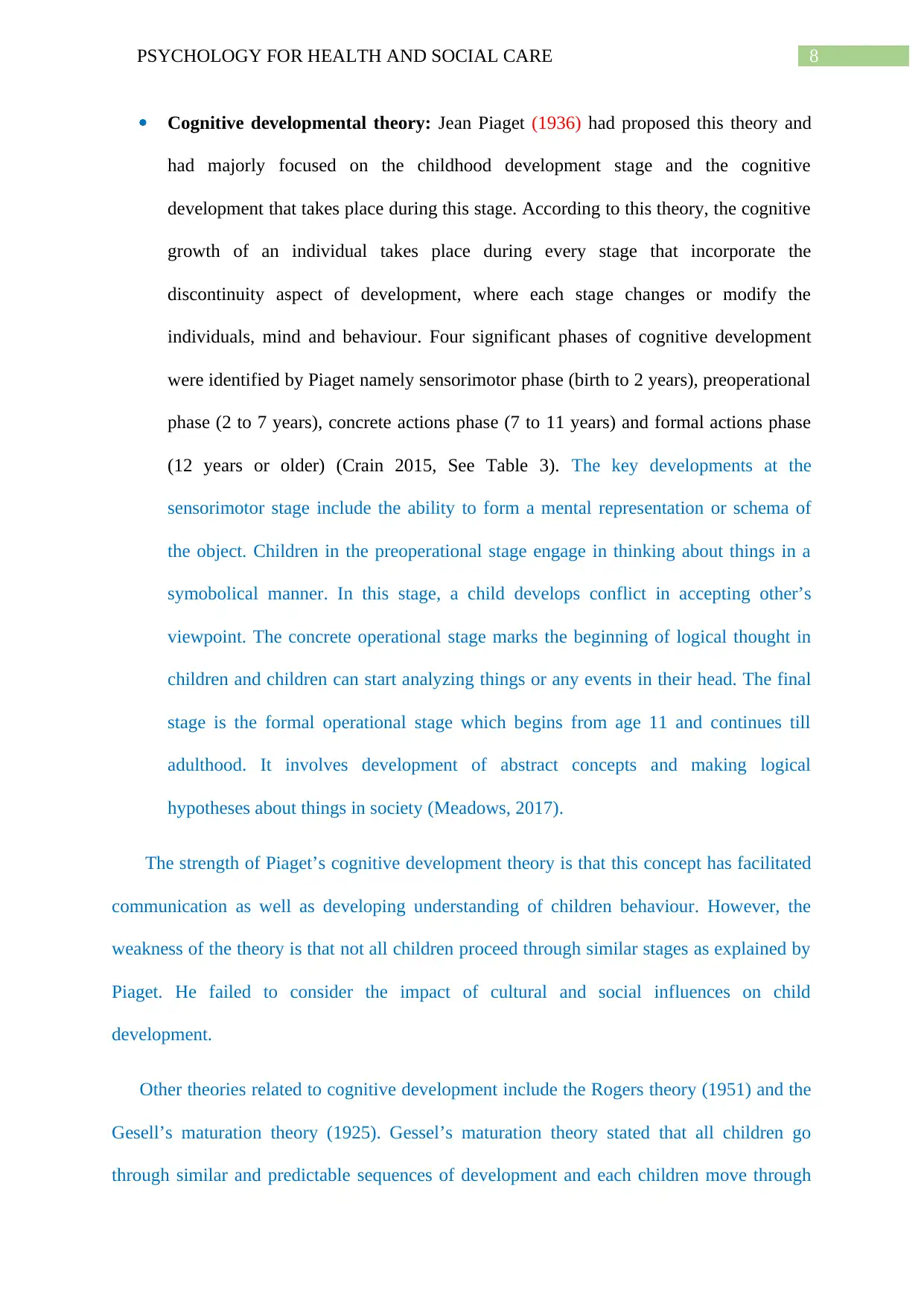
8PSYCHOLOGY FOR HEALTH AND SOCIAL CARE
Cognitive developmental theory: Jean Piaget (1936) had proposed this theory and
had majorly focused on the childhood development stage and the cognitive
development that takes place during this stage. According to this theory, the cognitive
growth of an individual takes place during every stage that incorporate the
discontinuity aspect of development, where each stage changes or modify the
individuals, mind and behaviour. Four significant phases of cognitive development
were identified by Piaget namely sensorimotor phase (birth to 2 years), preoperational
phase (2 to 7 years), concrete actions phase (7 to 11 years) and formal actions phase
(12 years or older) (Crain 2015, See Table 3). The key developments at the
sensorimotor stage include the ability to form a mental representation or schema of
the object. Children in the preoperational stage engage in thinking about things in a
symobolical manner. In this stage, a child develops conflict in accepting other’s
viewpoint. The concrete operational stage marks the beginning of logical thought in
children and children can start analyzing things or any events in their head. The final
stage is the formal operational stage which begins from age 11 and continues till
adulthood. It involves development of abstract concepts and making logical
hypotheses about things in society (Meadows, 2017).
The strength of Piaget’s cognitive development theory is that this concept has facilitated
communication as well as developing understanding of children behaviour. However, the
weakness of the theory is that not all children proceed through similar stages as explained by
Piaget. He failed to consider the impact of cultural and social influences on child
development.
Other theories related to cognitive development include the Rogers theory (1951) and the
Gesell’s maturation theory (1925). Gessel’s maturation theory stated that all children go
through similar and predictable sequences of development and each children move through
Cognitive developmental theory: Jean Piaget (1936) had proposed this theory and
had majorly focused on the childhood development stage and the cognitive
development that takes place during this stage. According to this theory, the cognitive
growth of an individual takes place during every stage that incorporate the
discontinuity aspect of development, where each stage changes or modify the
individuals, mind and behaviour. Four significant phases of cognitive development
were identified by Piaget namely sensorimotor phase (birth to 2 years), preoperational
phase (2 to 7 years), concrete actions phase (7 to 11 years) and formal actions phase
(12 years or older) (Crain 2015, See Table 3). The key developments at the
sensorimotor stage include the ability to form a mental representation or schema of
the object. Children in the preoperational stage engage in thinking about things in a
symobolical manner. In this stage, a child develops conflict in accepting other’s
viewpoint. The concrete operational stage marks the beginning of logical thought in
children and children can start analyzing things or any events in their head. The final
stage is the formal operational stage which begins from age 11 and continues till
adulthood. It involves development of abstract concepts and making logical
hypotheses about things in society (Meadows, 2017).
The strength of Piaget’s cognitive development theory is that this concept has facilitated
communication as well as developing understanding of children behaviour. However, the
weakness of the theory is that not all children proceed through similar stages as explained by
Piaget. He failed to consider the impact of cultural and social influences on child
development.
Other theories related to cognitive development include the Rogers theory (1951) and the
Gesell’s maturation theory (1925). Gessel’s maturation theory stated that all children go
through similar and predictable sequences of development and each children move through
⊘ This is a preview!⊘
Do you want full access?
Subscribe today to unlock all pages.

Trusted by 1+ million students worldwide
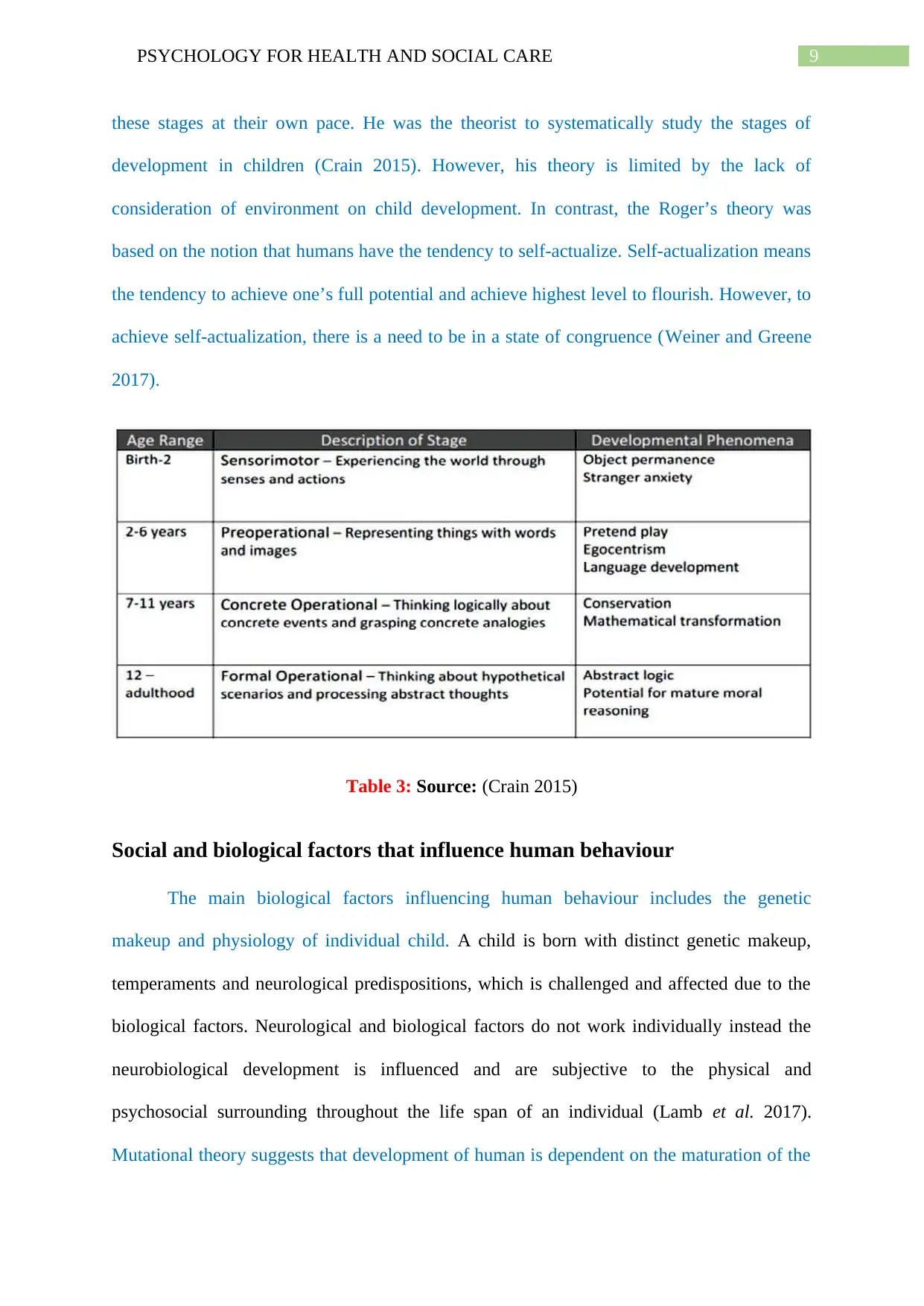
9PSYCHOLOGY FOR HEALTH AND SOCIAL CARE
these stages at their own pace. He was the theorist to systematically study the stages of
development in children (Crain 2015). However, his theory is limited by the lack of
consideration of environment on child development. In contrast, the Roger’s theory was
based on the notion that humans have the tendency to self-actualize. Self-actualization means
the tendency to achieve one’s full potential and achieve highest level to flourish. However, to
achieve self-actualization, there is a need to be in a state of congruence (Weiner and Greene
2017).
Table 3: Source: (Crain 2015)
Social and biological factors that influence human behaviour
The main biological factors influencing human behaviour includes the genetic
makeup and physiology of individual child. A child is born with distinct genetic makeup,
temperaments and neurological predispositions, which is challenged and affected due to the
biological factors. Neurological and biological factors do not work individually instead the
neurobiological development is influenced and are subjective to the physical and
psychosocial surrounding throughout the life span of an individual (Lamb et al. 2017).
Mutational theory suggests that development of human is dependent on the maturation of the
these stages at their own pace. He was the theorist to systematically study the stages of
development in children (Crain 2015). However, his theory is limited by the lack of
consideration of environment on child development. In contrast, the Roger’s theory was
based on the notion that humans have the tendency to self-actualize. Self-actualization means
the tendency to achieve one’s full potential and achieve highest level to flourish. However, to
achieve self-actualization, there is a need to be in a state of congruence (Weiner and Greene
2017).
Table 3: Source: (Crain 2015)
Social and biological factors that influence human behaviour
The main biological factors influencing human behaviour includes the genetic
makeup and physiology of individual child. A child is born with distinct genetic makeup,
temperaments and neurological predispositions, which is challenged and affected due to the
biological factors. Neurological and biological factors do not work individually instead the
neurobiological development is influenced and are subjective to the physical and
psychosocial surrounding throughout the life span of an individual (Lamb et al. 2017).
Mutational theory suggests that development of human is dependent on the maturation of the
Paraphrase This Document
Need a fresh take? Get an instant paraphrase of this document with our AI Paraphraser
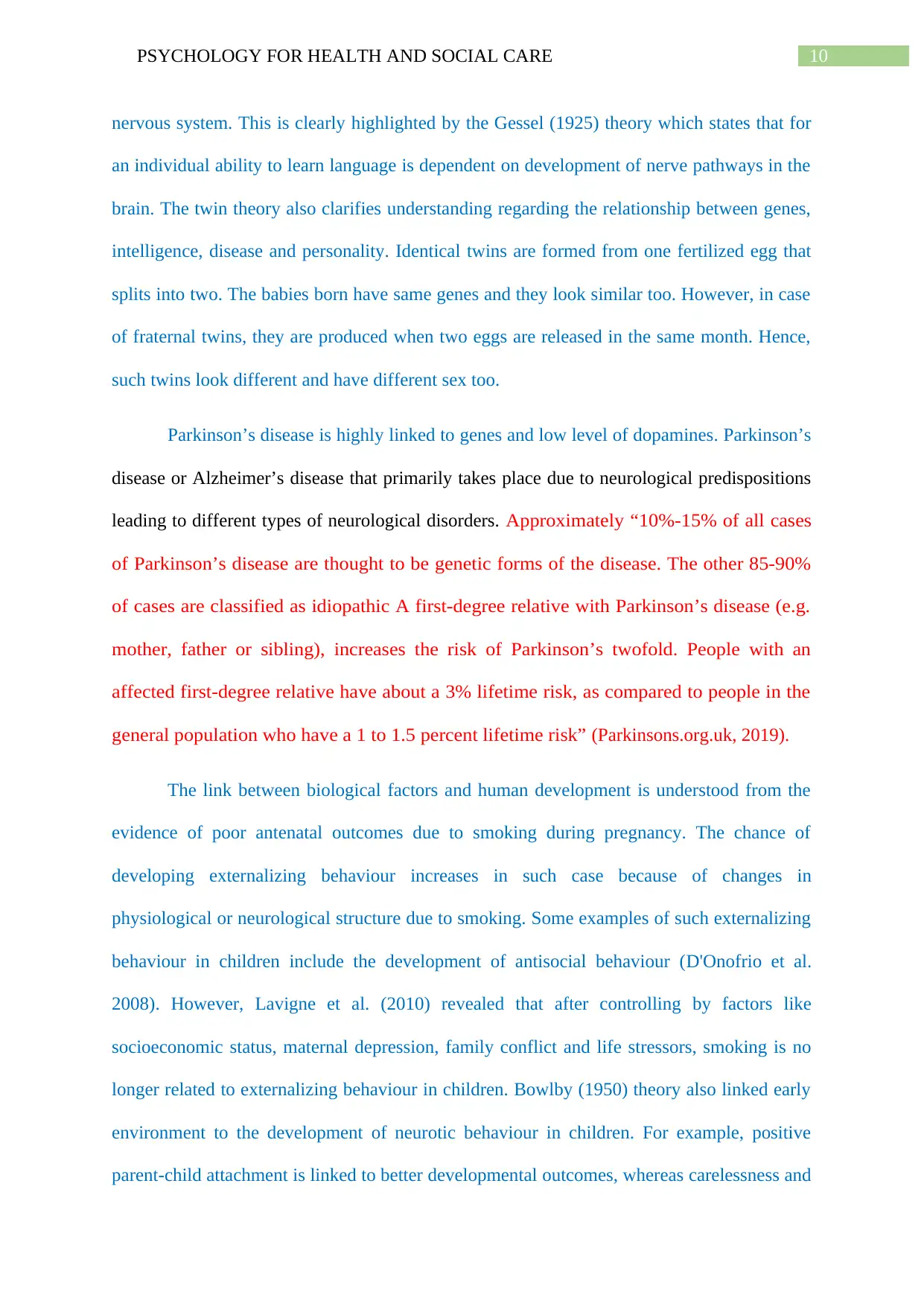
10PSYCHOLOGY FOR HEALTH AND SOCIAL CARE
nervous system. This is clearly highlighted by the Gessel (1925) theory which states that for
an individual ability to learn language is dependent on development of nerve pathways in the
brain. The twin theory also clarifies understanding regarding the relationship between genes,
intelligence, disease and personality. Identical twins are formed from one fertilized egg that
splits into two. The babies born have same genes and they look similar too. However, in case
of fraternal twins, they are produced when two eggs are released in the same month. Hence,
such twins look different and have different sex too.
Parkinson’s disease is highly linked to genes and low level of dopamines. Parkinson’s
disease or Alzheimer’s disease that primarily takes place due to neurological predispositions
leading to different types of neurological disorders. Approximately “10%-15% of all cases
of Parkinson’s disease are thought to be genetic forms of the disease. The other 85-90%
of cases are classified as idiopathic A first-degree relative with Parkinson’s disease (e.g.
mother, father or sibling), increases the risk of Parkinson’s twofold. People with an
affected first-degree relative have about a 3% lifetime risk, as compared to people in the
general population who have a 1 to 1.5 percent lifetime risk” (Parkinsons.org.uk, 2019).
The link between biological factors and human development is understood from the
evidence of poor antenatal outcomes due to smoking during pregnancy. The chance of
developing externalizing behaviour increases in such case because of changes in
physiological or neurological structure due to smoking. Some examples of such externalizing
behaviour in children include the development of antisocial behaviour (D'Onofrio et al.
2008). However, Lavigne et al. (2010) revealed that after controlling by factors like
socioeconomic status, maternal depression, family conflict and life stressors, smoking is no
longer related to externalizing behaviour in children. Bowlby (1950) theory also linked early
environment to the development of neurotic behaviour in children. For example, positive
parent-child attachment is linked to better developmental outcomes, whereas carelessness and
nervous system. This is clearly highlighted by the Gessel (1925) theory which states that for
an individual ability to learn language is dependent on development of nerve pathways in the
brain. The twin theory also clarifies understanding regarding the relationship between genes,
intelligence, disease and personality. Identical twins are formed from one fertilized egg that
splits into two. The babies born have same genes and they look similar too. However, in case
of fraternal twins, they are produced when two eggs are released in the same month. Hence,
such twins look different and have different sex too.
Parkinson’s disease is highly linked to genes and low level of dopamines. Parkinson’s
disease or Alzheimer’s disease that primarily takes place due to neurological predispositions
leading to different types of neurological disorders. Approximately “10%-15% of all cases
of Parkinson’s disease are thought to be genetic forms of the disease. The other 85-90%
of cases are classified as idiopathic A first-degree relative with Parkinson’s disease (e.g.
mother, father or sibling), increases the risk of Parkinson’s twofold. People with an
affected first-degree relative have about a 3% lifetime risk, as compared to people in the
general population who have a 1 to 1.5 percent lifetime risk” (Parkinsons.org.uk, 2019).
The link between biological factors and human development is understood from the
evidence of poor antenatal outcomes due to smoking during pregnancy. The chance of
developing externalizing behaviour increases in such case because of changes in
physiological or neurological structure due to smoking. Some examples of such externalizing
behaviour in children include the development of antisocial behaviour (D'Onofrio et al.
2008). However, Lavigne et al. (2010) revealed that after controlling by factors like
socioeconomic status, maternal depression, family conflict and life stressors, smoking is no
longer related to externalizing behaviour in children. Bowlby (1950) theory also linked early
environment to the development of neurotic behaviour in children. For example, positive
parent-child attachment is linked to better developmental outcomes, whereas carelessness and
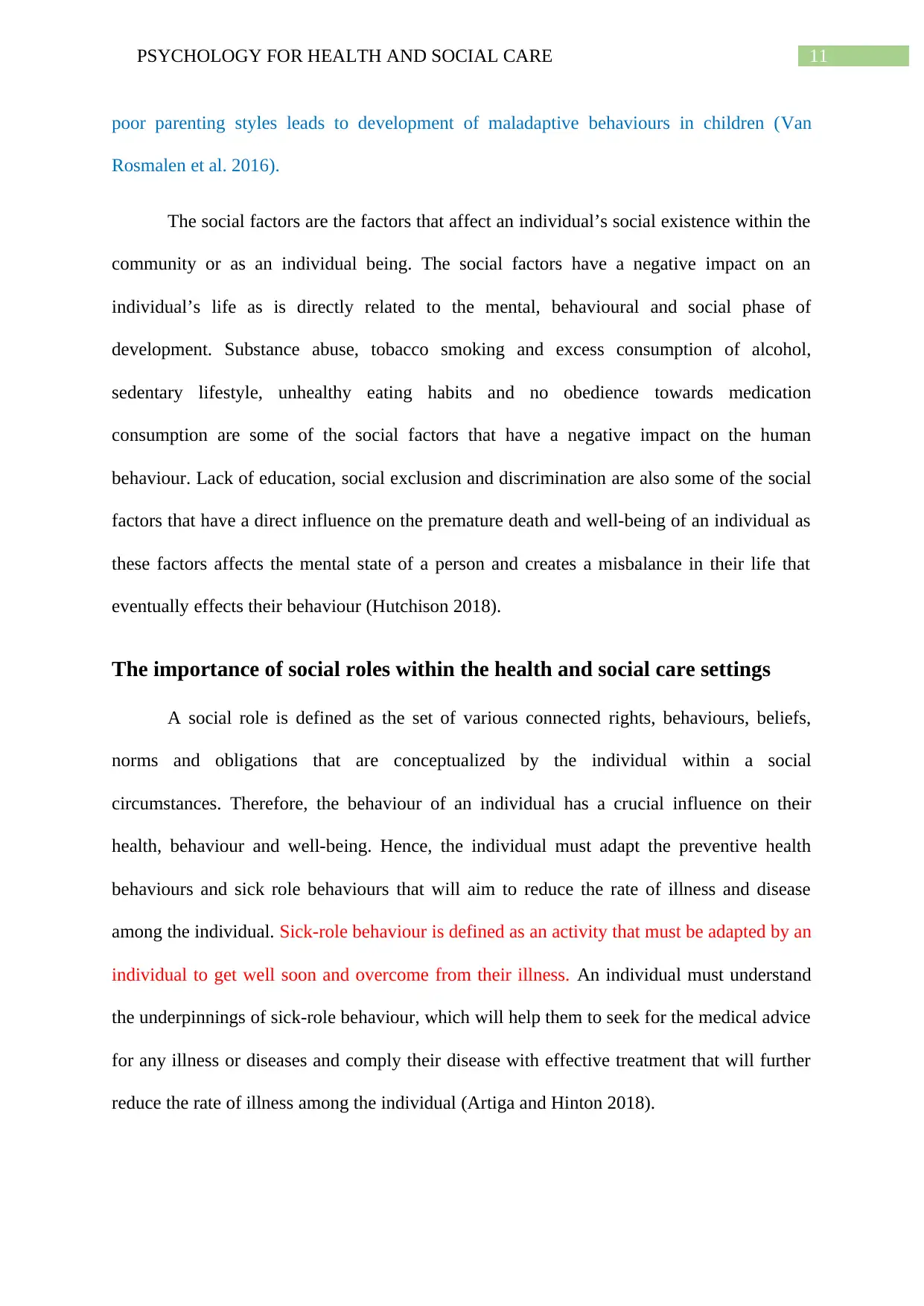
11PSYCHOLOGY FOR HEALTH AND SOCIAL CARE
poor parenting styles leads to development of maladaptive behaviours in children (Van
Rosmalen et al. 2016).
The social factors are the factors that affect an individual’s social existence within the
community or as an individual being. The social factors have a negative impact on an
individual’s life as is directly related to the mental, behavioural and social phase of
development. Substance abuse, tobacco smoking and excess consumption of alcohol,
sedentary lifestyle, unhealthy eating habits and no obedience towards medication
consumption are some of the social factors that have a negative impact on the human
behaviour. Lack of education, social exclusion and discrimination are also some of the social
factors that have a direct influence on the premature death and well-being of an individual as
these factors affects the mental state of a person and creates a misbalance in their life that
eventually effects their behaviour (Hutchison 2018).
The importance of social roles within the health and social care settings
A social role is defined as the set of various connected rights, behaviours, beliefs,
norms and obligations that are conceptualized by the individual within a social
circumstances. Therefore, the behaviour of an individual has a crucial influence on their
health, behaviour and well-being. Hence, the individual must adapt the preventive health
behaviours and sick role behaviours that will aim to reduce the rate of illness and disease
among the individual. Sick-role behaviour is defined as an activity that must be adapted by an
individual to get well soon and overcome from their illness. An individual must understand
the underpinnings of sick-role behaviour, which will help them to seek for the medical advice
for any illness or diseases and comply their disease with effective treatment that will further
reduce the rate of illness among the individual (Artiga and Hinton 2018).
poor parenting styles leads to development of maladaptive behaviours in children (Van
Rosmalen et al. 2016).
The social factors are the factors that affect an individual’s social existence within the
community or as an individual being. The social factors have a negative impact on an
individual’s life as is directly related to the mental, behavioural and social phase of
development. Substance abuse, tobacco smoking and excess consumption of alcohol,
sedentary lifestyle, unhealthy eating habits and no obedience towards medication
consumption are some of the social factors that have a negative impact on the human
behaviour. Lack of education, social exclusion and discrimination are also some of the social
factors that have a direct influence on the premature death and well-being of an individual as
these factors affects the mental state of a person and creates a misbalance in their life that
eventually effects their behaviour (Hutchison 2018).
The importance of social roles within the health and social care settings
A social role is defined as the set of various connected rights, behaviours, beliefs,
norms and obligations that are conceptualized by the individual within a social
circumstances. Therefore, the behaviour of an individual has a crucial influence on their
health, behaviour and well-being. Hence, the individual must adapt the preventive health
behaviours and sick role behaviours that will aim to reduce the rate of illness and disease
among the individual. Sick-role behaviour is defined as an activity that must be adapted by an
individual to get well soon and overcome from their illness. An individual must understand
the underpinnings of sick-role behaviour, which will help them to seek for the medical advice
for any illness or diseases and comply their disease with effective treatment that will further
reduce the rate of illness among the individual (Artiga and Hinton 2018).
⊘ This is a preview!⊘
Do you want full access?
Subscribe today to unlock all pages.

Trusted by 1+ million students worldwide
1 out of 24
Related Documents
Your All-in-One AI-Powered Toolkit for Academic Success.
+13062052269
info@desklib.com
Available 24*7 on WhatsApp / Email
![[object Object]](/_next/static/media/star-bottom.7253800d.svg)
Unlock your academic potential
Copyright © 2020–2026 A2Z Services. All Rights Reserved. Developed and managed by ZUCOL.





